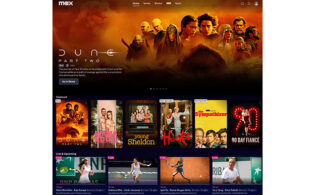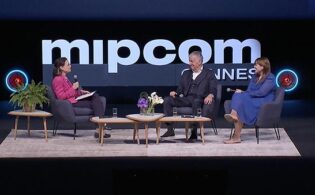Turner’s Gerhard Zeiler and Twentieth Century Fox’s Mark Kaner weighed in on the evolution of the international content business, the fate of output deals and the impact of Netflix’s overall content alliances with producers in a session at NATPE.
“International TV Has Grown Up” was the name of the wide-ranging discussion between Zeiler, the president of Turner International, and Kaner, the president of global distribution and international strategy at Twentieth Century Fox Television Distribution.
Kaner noted that some 25 years ago, when Rupert Murdoch told him that Warner Bros. was the studio’s biggest competitor at the time, he disagreed, telling the mogul that local programming was a far more potent rival. “That was in 1994. It’s truer today than it ever was.”
Kaner continued, “There is an enormous amount of great product being produced all over the world. The world is getting smaller. Now with streaming services, there will be greater opportunity for people to see that product [in the U.S.]. And it will be necessary for those big global companies to have local product in each market because those will wind up being the locomotives for them in each individual territory.”
Zeiler asked about the shifting demand for U.S. product, particularly in Europe. In 1998, when he was at RTL in Germany, “the prime-time schedule consisted of one U.S. series, the 20th repeat of Quincy. Seven years later, the most successful programs in Germany besides sports and news were the CSI franchises, House and NCIS. Today, in Germany, France and Spain, with the exception of The Big Bang Theory and Game of Thrones, I don’t see a lot of American programming [running] successfully on the big channels.”
“Our business is filled with ups and downs,” Kaner said on cyclical trends in the content-distribution sector. “Sometimes you’re hot and sometimes you’re not. But also, the international business has grown up. There is so much good product out there, the competition is significantly greater for the U.S. companies coming in and selling their product, which then has to be dubbed. And it’s natural that something that is homegrown will have an edge.
“I also think that there’s a focus in the U.S. that has changed. Our networks are more U.S.-centric, they have to be. The U.S. network business is so challenged, it’s so hard to make it work, the audiences aren’t as big as they used to be, except for big sports.”
International revenues are still “critically important to production, generally speaking,” Kaner added, noting that some shows are bigger drivers than others. “Bones was a long-term, very successful procedural and it made a lot of money over the years. Empire is a fantastic show, it’s a brilliant soap opera. We couldn’t sell it anywhere. Part of the change that has to happen going forward is that companies need to recognize that certain things will work and certain things won’t. The U.S. networks in the last year or so have become more U.S.-centric and that’s not a good thing. They should try to expand. A procedural will work. [With comedies] Big Bang Theory is the exception to the rule, The Simpsons is an exception. The thing about comedy is that it’s dependent on culture, language, nuance, timing. Dramas are easier.”
Kaner was then asked about opportunities in Asia. He referenced the challenges of dealing with China given government restrictions and pointed to the tremendous success of 21st Century Fox-owned Hotstar in India, a country that presents “a lot of opportunity, but it is always going to be very local.”
Zeiler noted, “India is the only market in the world where U.S. media companies are dominating the TV landscape,” referencing 21st Century Fox (Star), Viacom (Viacom18) and Sony. “Who knows, half of Zee is up for sale—maybe there will be a fourth American media company there.”
The conversation then moved to peak TV, and if quality levels have kept pace with the rising quantity of scripted being produced in the U.S.
“There’s never been a better time to watch programming,” Kaner said. “There’s some of the most extraordinary shows and motion pictures available, from all over the world. There’s also a tremendous amount of shit being made. At some point, you’re running out of talent. We’re not in the manufacturing business. We don’t have a formula.”
On recommendation algorithms, Kaner added, “One of the great things about our business is that it promotes curiosity. If there’s an algorithm constantly choosing what I’m going to watch, I worry about that.”
Next up they discussed output and volume deals and if those are being replaced by more à la carte agreements, like those preferred by buyers in the U.K.
“The days of output deals are over,” Kaner said. “Volume deals will depend on who is buying. Generally speaking, it will move more towards à la carte. The bottom and middle will fall out and only things that are really well received will work. There will be more buyers. The problem is the economics. It’s all about the economics. The cost of production is going up all the time. Our bosses say, we need to get more money [from content distribution]. That’s an issue, not just for the U.S.”
Zeiler then asked about the exclusive talent deals being inked by Netflix and others and what impact they will have on the industry.
“Everyone is going to have to figure out how to have greater flexibility in terms of their deal-making,” Kaner said. “What Netflix and some of the other streaming services have done is they are paying a high price now, but for all intents and purposes, you’re never going to see another dime. The studio business, the creative community, has lived off of residuals, being partners going forward in the product they created. It’s a really interesting moment in time. [The global SVODs] are almost going back to the old studio and network days, where you can just be a producer for hire, make 20 percent and you’ll never see another dime. I think the companies that are going to be successful going forward are going to have to [forge] new kinds of partnerships with the creative community.”
Ultimately, he said, “the need for content will never go away. That is going to save everybody. And we have to have great people to make this whole thing work.”






